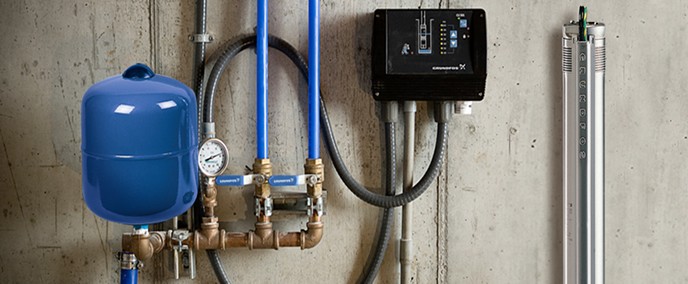Effortless Well Pump Replacement: Revitalizing Your Water Infrastructure with Confidence
Effortless Well Pump Replacement: Revitalizing Your Water Infrastructure with Confidence
Blog Article
Understanding the Key Components of Effective Water Filtration Equipments

Value of Water Filtration Equipment
Water filtering systems play an important role in making certain access to risk-free and clean alcohol consumption water by successfully removing impurities and pollutants. These systems are important in addressing the expanding concerns over water top quality and the prospective health threats connected with eating polluted water. By making use of different purification mechanisms such as reverse osmosis, turned on carbon, and UV sterilization, water filtering systems can efficiently remove unsafe materials like bacteria, infections, heavy steels, and chemicals from the water supply.
In addition, water filtration systems assist to boost the taste and odor of water by removing chlorine, sediments, and other toxins that can influence its quality. Water Softeners. This improvement in water quality not only makes it a lot more tasty but additionally encourages individuals to consume an ample quantity of water daily, promoting better hydration and general health and wellness
Kinds of Filtering Components

Physical filters are designed to physically stress out pollutants from the water. These filters can be made from materials like ceramic, carbon, or perhaps sand, and they work by capturing bits larger than the filter's pores as water passes through.
Chemical filters utilize different chemical processes to remove impurities from the water. Examples include activated carbon filters, which adsorb pollutants, and reverse osmosis membranes, which utilize pressure to separate contaminants from the water.
Organic filters make use of living organisms like algae or bacteria to break down natural matter and pollutants in the water. These filters are frequently used in wastewater therapy plants or all-natural water purification systems.
Comprehending the different kinds of filtration parts is critical for selecting the most suitable water filtration system for certain purification requirements.
Function of Sediment Filters
Sediment filters play an essential role in water filtering systems by properly catching strong bits suspended in the water. These filters are normally the initial line of protection in a purification system, removing bigger particles such as sand, silt, dirt, and rust prior to the water relocates via finer filtration phases. By capturing these debris, the filters stop them from reaching downstream parts, thus expanding the lifespan and efficiency of the whole system.
The feature of debris filters is important in preserving water high quality and shielding delicate tools from damages triggered by debris. Furthermore, by getting rid of visible particles, sediment filters improve the clarity and taste of the water. Frequently cleaning up or replacing debris filters is essential to guarantee optimum performance. Disregarding this maintenance can cause obstructing, minimized water circulation, and endangered purification performance. In general, debris filters are vital parts that contribute dramatically to the efficiency of water filtration systems.
Duty of Activated Carbon Filters
Playing a vital duty in water filtering systems, triggered carbon why not try this out filters contribute in getting rid of contaminations and contaminants from the water supply. These filters are designed to adsorb and catch a large range of toxins, including chlorine, volatile natural substances (VOCs), chemicals, and herbicides. The triggered carbon product has a huge surface, permitting for the efficient capturing of contaminants through a procedure called adsorption. As water goes through the filter, the activated carbon holds and brings in onto the impurities, ensuring that the water that comes out beyond is cleaner and safer for consumption.
Turned on carbon filters are extremely reliable at enhancing the taste and odor of water by reducing chemicals that can impact its quality. Due to their adaptability and reliability, turned on carbon filters are an essential part in guaranteeing that water is purified to the greatest criteria before getting to consumers.
Comprehending Reverse Osmosis Equipments
Reverse osmosis systems are innovative water filtration systems that utilize a sophisticated procedure to eliminate contaminants and impurities from alcohol consumption water. These systems work by applying pressure to the water, requiring it through a semi-permeable membrane. This you could look here membrane functions as a barrier, permitting just distilled water particles to go through, while obstructing bigger particles such as minerals, chemicals, and various other pollutants. Because of this, the water that appears beyond is dramatically cleaner and much safer for consumption.
Furthermore, reverse osmosis systems are relatively low-maintenance and can be installed under the sink or in a central filtering system, providing practical accessibility to clean water throughout the household. In general, comprehending how reverse osmosis systems function can aid individuals make informed choices regarding their water filtering needs.
Verdict
In conclusion, reliable water their website filtration systems are critical for guaranteeing secure and clean drinking water. By recognizing the function and duty of each component, individuals can make enlightened decisions when picking a water filtering system.
Water purification systems play an important duty in guaranteeing accessibility to risk-free and tidy alcohol consumption water by efficiently getting rid of contaminations and pollutants. By utilizing numerous purification mechanisms such as reverse osmosis, triggered carbon, and UV sanitation, water purification systems can efficiently eliminate damaging materials like microorganisms, viruses, heavy metals, and chemicals from the water supply.
Sediment filters play a critical duty in water filtration systems by efficiently capturing solid bits put on hold in the water (Well Pump Replacement).Playing a crucial role in water filtration systems, activated carbon filters are crucial in removing impurities and contaminants from the water supply.Reverse osmosis systems are advanced water purification systems that utilize a sophisticated procedure to remove pollutants and pollutants from drinking water
Report this page